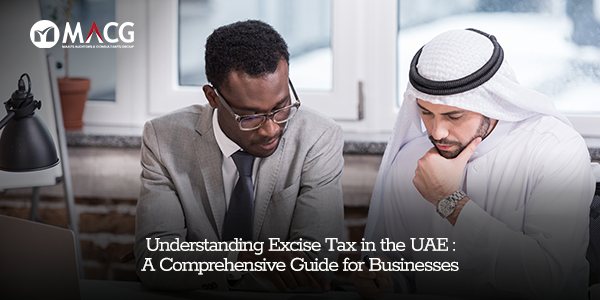The UAE introduced Excise Tax in 2017 as part of its economic diversification strategy and commitment to public health. This indirect tax applies to specific goods deemed harmful to human health or the environment, including tobacco, energy drinks, carbonated beverages, and electronic smoking devices.
As a business operating in the UAE, compliance with Excise Tax regulations is crucial to avoid penalties and ensure smooth operations. This guide by Maats Auditors & Consultants covers everything you need to know—from registration requirements to filing procedures and exemptions.
Excise Tax in the UAE?
Excise Tax is a consumption-based tax imposed on manufacturers, importers, and stockpilers of certain goods. Unlike VAT, it is not directly paid by consumers but is included in the product’s final price.
✔ Imposing taxes on harmful products serves multiple important purposes. Primarily, it discourages the consumption of goods that pose risks to public health or the environment, such as tobacco, sugary drinks, and carbon-emitting fuels. By making these products more expensive, governments can influence consumer behavior and promote healthier, more sustainable choices. Additionally, the revenue generated from such taxes can be directed toward funding public welfare initiatives, including healthcare, education, and environmental protection. This approach also aligns with global efforts to improve health outcomes and address environmental challenges.
Which Products Are Subject to Excise Tax?
The UAE Federal Tax Authority (FTA) currently applies Excise Tax on:
| Product Category | Excise Tax Rate |
| Tobacco & related products | 100% |
| Electronic smoking devices & liquids | 100% |
| Energy drinks | 100% |
| Carbonated drinks (excluding plain sparkling water) | 50% |
| Sweetened beverages (artificially sweetened) | 50% |
Exempted Products:
- Ready-to-drink beverages with ≥75% milk content
- Infant formula & baby food
- Medically prescribed beverages
- Dietary supplements
Who Needs to Register for Excise Tax?
Unlike VAT, Excise Tax in the UAE does not have a minimum registration threshold. This means that businesses must register for Excise Tax before they begin any activity involving excisable goods. Such activities include manufacturing excise goods for consumption within the UAE, importing excisable products, or stockpiling these goods under certain conditions. Additionally, entities operating excise warehouses, such as warehouse keepers, are also required to register.
Registration is mandatory regardless of the scale or frequency of the activity, highlighting the strict compliance requirements for excise-related operations. The aim is to ensure proper monitoring and taxation of goods that are considered harmful to health or the environment, such as tobacco, sugary drinks, and energy drinks.
However, there are limited exemption conditions that may apply in specific cases. Businesses may be exempt from Excise Tax registration if they import excisable goods less than once every six months or if their imports occur fewer than four times within a two-year period. These exemptions provide relief for occasional importers while maintaining regulatory oversight for consistent or large-scale activities.
How to Register for Excise Tax in the UAE?
Registration is done through the FTA’s EmaraTax portal:
- Create an account on EmaraTax
- Add a new Taxable Person or select an existing profile
- Navigate to “View” > “Excise” > “Register”
- Submit required documents:
- Trade License
- Bank Letter
- Passport & Emirates ID of authorized signatory
- Company incorporation documents
The FTA typically takes 20 working days to process applications.
Filing Excise Tax Returns & Deadlines
Registered businesses must:
- File monthly returns by the 15th of each month
- Submit additional forms (if applicable):
- Excise Liability Form
- Excise Declaration Form
- Deductible Excise Tax Form
E-Filing Process:
- Log in to EmaraTax
- Complete & submit the return
- Print confirmation for Customs clearance
Excise Tax Penalties in the UAE
Non-compliance with Excise Tax regulations in the UAE can result in significant financial penalties. One of the most serious violations is failing to register for Excise Tax when required. Businesses that engage in excisable activities without proper registration face a penalty of AED 10,000. This emphasizes the importance of ensuring compliance from the outset of operations.
Timely and accurate tax return filing is also critical. A delay in submitting an Excise Tax return results in a fine of AED 1,000 for the first offense, which increases to AED 2,000 for any subsequent violations. Additionally, providing incorrect price information—especially underreporting the value of excisable goods—can lead to a penalty of AED 5,000.
Maintaining proper records is another essential requirement under UAE tax law. Failure to keep accurate and complete documentation attracts a fine of AED 10,000 for the first offense. If repeated, the penalty doubles to AED 20,000. These penalties highlight the importance of strong internal controls, timely reporting, and accurate record-keeping to avoid costly enforcement actions by the Federal Tax Authority.
Final Thoughts
Excise Tax compliance in the UAE involves strict regulations, detailed documentation, and timely reporting—making expert support essential for businesses dealing with excisable goods. At Maats Auditors & Consultants, our experienced tax advisory team is here to simplify the process. We also represent clients during FTA audits and provide tailored tax optimization strategies to help minimize liabilities while staying fully compliant.
Whether you’re starting out or managing ongoing excise obligations, our team ensures you stay on track and avoid costly penalties.
Need expert guidance? Contact us today for a free consultation and take the first step toward stress-free Excise Tax compliance.


